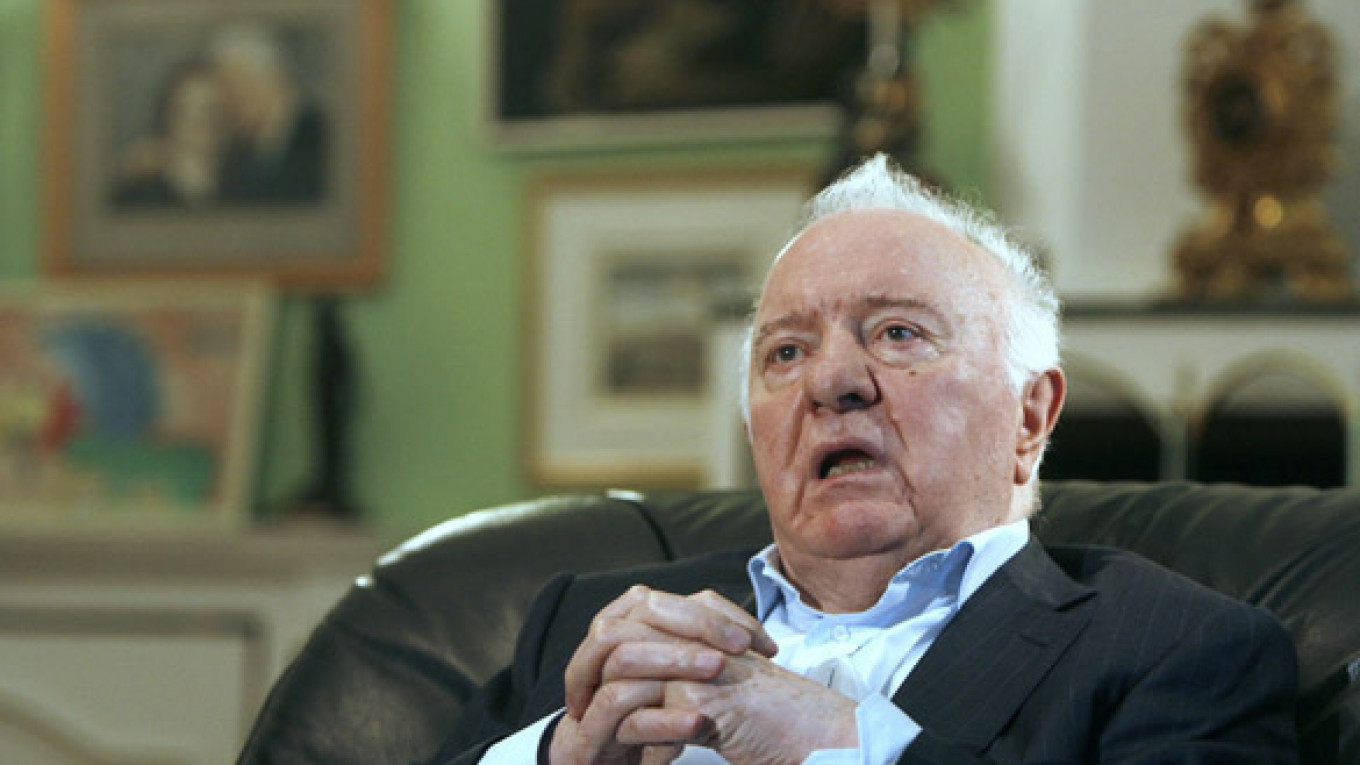TBILISI, Georgia — Eduard Shevardnadze keeps a small piece of the Berlin Wall in his study, and the man who helped end the Cold War says the risk of a new one remains.
Twenty years after the wall came down, the former Soviet foreign minister who aided Moscow’s reconciliation with the West says the world is a safer place but warns against complacency.
In an interview before the November anniversary of the fall of the Berlin Wall, the chief collaborator of former Soviet President Mikhail Gorbachev lamented the Soviet collapse but said he had no regrets about the policies of “perestroika” and “glasnost” that preceded it.
The world must now grapple with a resurgent Russia and the untold power of an emerging China, he said. U.S.-Russian relations remain a cause for concern.
“The world is undoubtedly more secure than during the Cold War. But I cannot say we can rest easy,” he said in an interview over the weekend in his guarded residence in the Georgian capital, Tbilisi.
“The first signs of a new Cold War have already appeared,” he said, referring to U.S. plans to deploy a missile shield in Central Europe, which Washington says is to defend against Iran.
Russia says the plan is a direct threat and has threatened to deploy rockets in Kaliningrad, near Poland, in retaliation.
Shevardnadze, his speech slow and trademark white hair thinning at the age of 81, warned of the dangers posed by a growing insurgency in Russia’s southern republics.
After communism collapsed, he became president of newly independent Georgia and he now criticizes the actions of his successor, U.S. ally Mikheil Saakashvili.
He laments how Saakashvili sent in Georgia’s army against pro-Russian separatists in South Ossetia in August last year, resulting in a devastating five-day war with Russia.
And he spoke with concern about the unpredictability of China in a new world balance of power. As president of Georgia, Shevardnadze said he warned then-President Vladimir Putin, now prime minister, of Chinese pretensions toward Siberia.
“Undoubtedly, the world is a better place,” he said. “It has become calmer. Relations between countries have improved. … But we must think not only about the situation today, but also about tomorrow. What’s going to happen with China?”
The world this year commemorates the 20th anniversary of the fall of the Berlin Wall, and Shevardnadze accepts the gratitude expressed to him on the wooden mounting of the piece of the wall in his study. It bears the words, “Eduard, Danke!”
On Nov. 9, 1989, Guenter Schabowski, spokesman for the East German government, showed a piece of paper to journalists and asked, “You’ll all have seen this?”
The statement waved “preconditions” for East Germans to travel to the West. Within hours thousands were streaming through the gates. The wall, thrown up in 1961 to divide East Berlin from West, was coming down.
Shevardnadze, who later fell from grace with the 2003 Rose Revolution that toppled him as Georgian president, was instrumental in the opening up of Soviet society under Gorbachev in the late 1980s and defining a new policy of pragmatic idealism for dealing with the West and ending the Cold War.
A Georgian with a dry wit and wan smile, he marked a clean break in style and substance from his stolid predecessors as top diplomat. He says the fall of the Berlin Wall came as no surprise.
“I knew that sooner or later it would happen. We didn’t help or prevent it. The Germans themselves started to break up the Berlin Wall,” he said. “I believe that in those years I was right, and the policy that I and Gorbachev pursued was the only correct policy, although the result of that policy became the collapse of the Soviet Union.
“What can you do?” he said, smiling. “The Soviet Union collapsed, and Georgia became independent.”
A Message from The Moscow Times:
Dear readers,
We are facing unprecedented challenges. Russia's Prosecutor General's Office has designated The Moscow Times as an "undesirable" organization, criminalizing our work and putting our staff at risk of prosecution. This follows our earlier unjust labeling as a "foreign agent."
These actions are direct attempts to silence independent journalism in Russia. The authorities claim our work "discredits the decisions of the Russian leadership." We see things differently: we strive to provide accurate, unbiased reporting on Russia.
We, the journalists of The Moscow Times, refuse to be silenced. But to continue our work, we need your help.
Your support, no matter how small, makes a world of difference. If you can, please support us monthly starting from just $2. It's quick to set up, and every contribution makes a significant impact.
By supporting The Moscow Times, you're defending open, independent journalism in the face of repression. Thank you for standing with us.
Remind me later.


